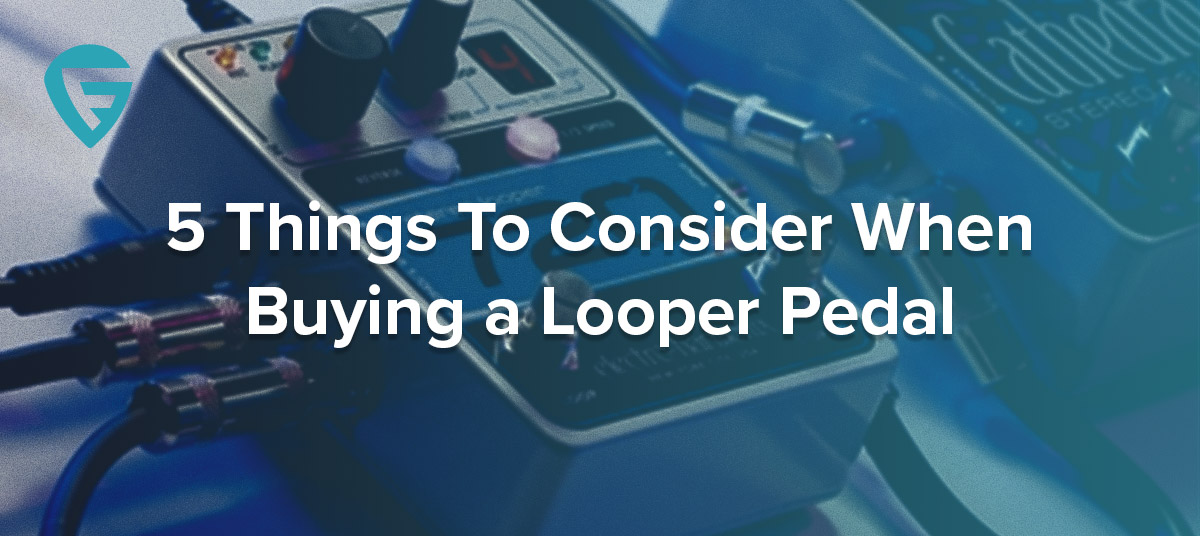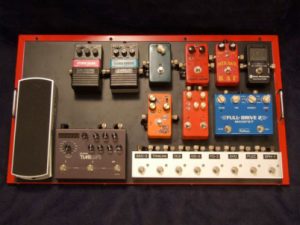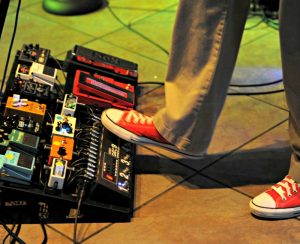- Home
- Instruments
- Gear
- Recording
- Lessons
- Reviews
- Blog

Looper pedals are awesome little devices, there's no question about it. If you don't know exactly how they work, check out this article here ‘What Are Looper Pedals?' . For an average guitar player, a looper pedal is a true force multiplier. From all the guitar effects you can get out there, these pedals have the potential to have the largest impact on your tone.
With that said, not all looper pedals are created equally. There are many different types of these devices on the market, and shopping for one can be rather confusing. In order help you make the best choice, we have prepared 5 things to consider when buying a looper pedal. Answering these five questions will eliminate a large portion of confusion and allow you to focus on what really matters.

Before we go any further and really dig deep into all different kinds of looper pedals, we need to get something out of the way. What you need to understand before shopping for one of these is that looper pedals come with a very broad range of price tags.
There are affordable models out there, but there are also very expensive ones. Figuring out just how much money you are comfortable spending on a looper pedal is a decision you definitely need to make before you go any further. It's very easy to get distracted by all the features some of these stompboxes have to offer, and spend a lot more money than you initially planned to. Decide a budget and stick to it.
 If you can figure out the kind of application you are planning on using the looper pedal for, it can greatly simplify things. Seriously, these pedals vary so widely when it comes to different features and options. For example, if you just need a model that will loop one of your guitar sections, you can find very simple and inexpensive pedals that will get that job done.
If you can figure out the kind of application you are planning on using the looper pedal for, it can greatly simplify things. Seriously, these pedals vary so widely when it comes to different features and options. For example, if you just need a model that will loop one of your guitar sections, you can find very simple and inexpensive pedals that will get that job done.
On the other hand, if you require more loops than one and a better quality of the recording, you will have to invest in a more complex model that covers all of these requirements. Figuring out what you will use a looper pedal for is definitely among the first things you need to decide.
 When you ask an average guitar player about looper pedals, they will probably tell you that it's a great tool to have when you want to spice up your music a bit. However, looping the guitars is not the only thing these pedals can do. Depending on what kind of application you have in mind, looper pedals can be used in combination with microphones and even MIDI controllers.
When you ask an average guitar player about looper pedals, they will probably tell you that it's a great tool to have when you want to spice up your music a bit. However, looping the guitars is not the only thing these pedals can do. Depending on what kind of application you have in mind, looper pedals can be used in combination with microphones and even MIDI controllers.
Naturally, models which are capable of this are a bit more complex than you average looper pedal, but they do exist. If you only need to use this device with a guitar, there's an abundance of models to choose from. However, if you need to have that extra flexibility of using a microphone with the pedal, the spectrum of models that will fit your needs shrinks considerably.
The core of looper pedals is their ability to record segments of a composition and repeat them. The length of the recording you get will depend on the model of the pedal, and its ability to expand its memory. More basic pedals will come with a recording length that is pretty much set in stone. More flexible pedals have SD card slots that allow you to increase the length of the recording considerably.
This also has a lot to do with the quality of sound you require. If you need pristine quality of the recording, that will eat up more memory on the pedal. Luckily there are pedals out there which can give you the best quality possible, while also allowing you to expand the memory to a point where you can have several hour long loops.

Finding out if you are going to use a looper pedal for a live performance or mainly home use will somewhat dictate the choice of pedals you will go for. If live performance is something you see yourself doing a lot, you will probably appreciate a more simple layout that is easy to use on the fly, and easy to find in dimly lit venues.
A looper pedal in the form of a simple stompbox will probably yield best results, but this also depends on what kind of features you require in a looper pedal. For home use, you can go as big and clunky as you want. There are some great pedals out there which are simply not that easy to use on a whim, and take some time to get used to. These will be great for home use, but not so much on stage.
Answering all of these questions, if possible, will greatly help you choose the best looper pedal for you. Everyone has their own taste and style. You need to find a pedal that will fit yours the most. If you are on a tight budget, there are a lot of affordable pedals that will probably take care of all your needs. On the other hand, if you want to go more complex right off the bat, the sky is the limit.
Finally, make sure to check out our list of Best Looper Pedals on the market.

Reader Interactions